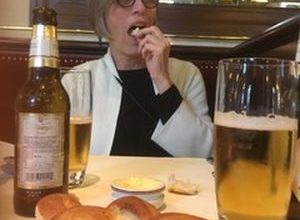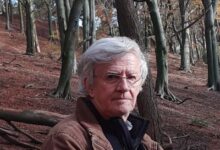Escape by Rob Essley
Escape
by Rob Essley
“For from this viewpoint, nothing ever changes except your proximity to the Truth.” — Ichart Gerbier, 1788
Throngs of black-headed matchsticks poured out of the factory, their faces hidden behind veils of soot and ash. With a sense of urgency, as if escaping from a burning, painful fate, they ebbed and surged toward the gate. Eight meters high and razor-wired along the top, it was purported to be designed to keep vandals and industrial spies out of the thirty-acre complex, but the razor wire was on the inside edge. Li sneered at one of the many security cameras positioned over the horde, taking small satisfaction in even a supposed respite from his generic, repetitive existence.
Li didn’t come there to get rich, but held out hope for a bonus. Just last week, they’d spent the money to install anti-jumping nets, so it was obvious profits were in the black, despite the still broken washbasins in the restrooms and broken safety guards on nearly every piece of machinery. One had to be extremely careful working for Hao Xin, especially since the much-publicized jumps back in the summer. It had been nearly sixty degrees inside the plant the first time someone jumped. Sweaty, dangerous conditions, stagnant air, all at a time of maximum production requirements. The seventy and eighty hour work-weeks had pushed a few men and one woman to the brink, and they’d jumped. One after another, all five of them in one day.
Whap-whap-whap, Li heard their bodies hit the concrete. He closed his eyes against the memory but tasted it vividly and took a moment to shake back to reality. The shift was done, and he was headed for his tiny apartment in Hangzhou. The bus, loaded down with filthy factory workers, hummed along and jostled toward the city. No one spoke except a pair of chattering young women, their Cantonese out of place and bird-like amid the bus’s smooth droning. Li could pick out every sixth word, and from this surmised they spoke of going home for the new year. Most of the workers went home, and some even stayed back in their villages. When the work season came on strong, people poured out of the mountains and filled positions up and down the coast in factories and assembly plants. Demand for labor was never scarce in China, but neither was supply. As evidenced by the absence of empty seats on the bus, and men standing up and down the aisle.
Li pushed open the thin door and put his mask on the table. He methodically removed his clothes and wiped himself down with a damp rag from the pail beside his window. There hadn’t been running water in his part of the city for a week, but his bucket still seemed fairly clean. He ladled out a scoop of water and slurped it up. A picture of some ducks and a serene lake hung above his bed. A squat toilet yawned in one corner of the room and a mini-fridge hummed and clicked. Li flopped himself down on the bed and took a deep breath. Robert DeNiro smiled at him from a magazine clipping on the wall next to another one of Steve McQueen. They gave him confidence; DeNiro was Li’s favorite Western actor, and McQueen his father’s.
It had been nearly two years since Li’s father, Bu, had fallen into a piece of machinery and come out the other side in mashed and pulpy parts. The factory had closed off part of the production floor for almost an hour, the longest partial closure in company history. They’d gathered up what remained of Bu and sent him off to the hospital, but there was nothing resembling a human left. Just his necklace with the small metal swan Bu’s father had made for him forty years ago. The company put up four hundred yuan for a short-form funeral, and the mid-level manager, Qin, had attended the signing of papers. Li’s mother had wept only for a moment, then picked up her copies of the death notice to take back to her village. She had work to do back home caring for the other four children and her mother, who’d been there for nearly ninety years.
Li wore his father’s necklace after that, and now sat upon his cot and pulled it out to look at it. Out in the street the din of pedestrians and merchants mingled together, the sounds of laughter peppered the air. Li chuckled to himself as he often did. Chuckled about the loss, about the gift, and about the future. He stood and put a hand on the balcony window. Warm to the touch, almost hot. The ancient metal frame would hardly slide in its track anymore but he lifted it straight up and it came out. He set it against the wall and leaned out the window, staring down forty feet to the street. Beneath him were eighteen or nineteen young people gathered around a merchant selling pirated DVDs of old movies. Li breathed in the welcome breeze from outside and chuckled to himself once more.
The DVD player lit up and he put on Raging Bull, adapted for Chinese. His father had watched this with him before he’d passed away, and Li thought he probably enjoyed it. But Li couldn’t focus on the movie. He sat there dejected, staring at the floor.
He awoke in the morning and realized he was late, so threw his clean-suit in a bag and hustled out the door to meet the bus. It was already gone. He sprinted down the block, heading east and saying to himself over and over again, no, no, I’m not late, I’m sorry but you must be mistaken, I am a diligent worker and I must work, please let me work.
The large gate with razor wire had been closed and locked for the day. When Li rang the bell, a stern-looking security guard came strolling over and barked, “Yes? What do you want?”
Li felt his cheeks flush. “I-I’m so sorry,” his voice cracked, “but I must get inside and go to work. Can you let me in please?”
The security guard stood straight, took a deep breath. His nose tilted ever so slightly skyward. “I’m sorry, but your shift began sixteen minutes ago. You’ll have to issue a statement.”
Li knew a statement was not an option. Even now, Qin would be walking the stations, and there among the blood-stained machinery where his father had perished, Li’s absence would be obvious. “Please, call Mr. Qin and let’s get him to grant me a one-time pass. For my father’s sake.” He put on the weariest face he had, and aimed it at the guard. Qin walked around the corner and looked Li up and down.
“Why are you late?”
“I am so sorry, Mr. Qin, but I—“
“You nothing. Even the lowest worker in this factory manages to get here on time. They know their livelihood depends on it.”
“If you would grant me this one-time pass, I would be forever in your debt.” The words tasted like dung in Li’s dry mouth.
Qin made a show of considering, then pinched his mouth into a look of genuine regret. “I’m sorry, Mr. Li. But you must leave. Your weekly wages will be posted to your account. See the clerk after next Tuesday for your final statement.”
Li began to weep and ran out into the street, headed back toward his apartment. He felt the necklace and a rage grew within him. Steve McQueen’s face appeared in his mind, and urged him to steal a car. Drive it into the factory. He looked around and saw only pedicabs, rickshaws, and large work vans. The only car in sight was a black Mercedes, moving away from him on Baoling Lu. Steve gave him a sneer and he ran toward a box van parked at a loading dock. Its driver door was open and the keys hung in the ignition. He climbed in. Next to him on the bench seat were DeNiro and McQueen. Li started the diesel engine and put the van in gear. Behind him, from the box, came the clucking alarm of workers.
He pushed it to 100 kilometers per hour, and ran through the gate, taking out part of the guard house with it. Alarms sounded, and the scrape of metal squealed in competition. Workers were taking their short stretch break outside the factory when he came driving in. He parked next to the entrance, ran up the stairs, and readied his speech. But the words would not come. Just the frowning disapproval of Steve McQueen and the angry urgings of DeNiro. Li looked for the ladder near his old station, right where his father had been sucked into the machinery. He ascended, shouting to the other workers to join him in revolt. But nobody came. He stood atop the towering piece of equipment and listened to the alarm pierce the air.
In came Qin, rushing up to the ladder and ascending fast. Li put his head down and focused, holding tight to the rail with his right hand. As Qin ran up on him, angrily shouting threats and invective, Li kicked him in the throat and crushed his windpipe. As Qin sailed downward to the concrete, his shrieks cut short by the ruined passage in his neck, he landed hard with a sickly splat right where Li’s father had lain in pieces.
When they took him away, Li looked back over his shoulder at the machine, and he thought he saw McQueen shoot him a wink.
About the author
No details given









